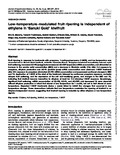Low-temperature-modulated fruit ripening is independent of ethylene in ‘Sanuki Gold’ kiwifruit

View/
Date
2011Author
Mworia, Eric G.
Yoshikawa, Takashi
Salikon, Nadiah
Oda, Chisato
Asiche, William O.
Yokotani, Naoki
Abe, Daigo
Ushijima, Koichiro
Nakano, Ryohei
Kubo, Yasutaka
Metadata
Show full item recordAbstract
Fruit ripening in response to treatments with propylene, 1-methycyclopropene (1-MCP), and low temperature was characterized in ‘Sanuki Gold’ kiwifruit,Actinidia chinensis Planch. Propylene treatment immediately induced rapid fruit softening, increased AC-PG (polygalacturonase) and AC-EXP (expansin) mRNA accumulation, and stimulated an
increase in the soluble solid concentration (SSC) and a decrease in titratable acidity (TA). After 3 d exposure to
propylene, ethylene production and AC-PL (pectate lyase) mRNA accumulation were observed. 1-MCP treatment
after 24 h exposure to propylene eliminated AC-PG mRNA accumulation and suppressed continued changes in SSC
and TA. Application of 1-MCP at the start of the treatment, followed by continuous propylene exposure, markedly
delayed fruit softening, and the expression of the cell wall-modifying genes, and changes in the SSC and TA,
indicating that kiwifruit become insensitive to ethylene at least for 3 d following 1-MCP exposure. Surprisingly,
significant fruit softening, mRNA accumulation of AC-PG,AC-PL, and AC-EXP, and decreased TA were observed
without ethylene production in intact fruit stored at low temperature for 1 month, but not in fruit stored at room
temperature. Repeated 1-MCP treatments (twice a week) failed to inhibit the changes that occurred in low
temperature storage. These observations indicate that low temperature modulates the ripening of kiwifruit in an
ethylene-independent manner, suggesting that kiwifruit ripening is inducible by either ethylene or low temperature
signals.
